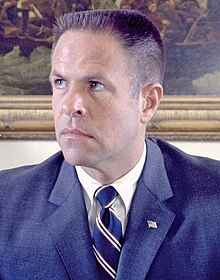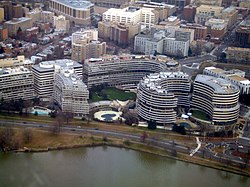
The Watergate scandal was a political scandal in the United States involving the administration of President Richard Nixon which ultimately led to Nixon's resignation. It revolved around members of a fundraising organization associated with Nixon's 1972 re-election campaign breaking into the Democratic National Committee headquarters located in the Watergate Office Building in Washington, D.C., on June 17, 1972, and Nixon's subsequent attempts to conceal his administration's involvement.

Nixon is a 1995 American epic historical drama film directed by Oliver Stone, produced by Stone, Clayton Townsend, and Andrew G. Vajna, and written by Stone, Christopher Wilkinson, and Stephen J. Rievele, with significant contributions from "project consultants" Christopher Scheer and Robert Scheer. The film tells the story of the political and personal life of former U.S. President Richard Nixon, played by Anthony Hopkins.

Jeb Stuart Magruder was an American businessman and high-level political operative in the Republican Party who served time in prison for his role in the Watergate scandal.

Everette Howard Hunt Jr. was an American intelligence officer and author. From 1949 to 1970, Hunt served as an officer in the Central Intelligence Agency (CIA), where he was a central figure in U.S. regime change in Latin America including the 1954 Guatemalan coup d'état and the 1961 Bay of Pigs Invasion in Cuba. Along with G. Gordon Liddy, Frank Sturgis, and others, Hunt was one of the Nixon administration's so-called White House Plumbers, a team of operatives charged with identifying government leaks to outside parties.

John Daniel Ehrlichman was an American political aide who served as White House Counsel and Assistant to the President for Domestic Affairs under President Richard Nixon. Ehrlichman was an important influence on Nixon's domestic policy, coaching him on issues and enlisting his support for environmental initiatives.

Ronald Louis Ziegler was the 13th White House Press Secretary, serving during President Richard Nixon's administration.

Louis Patrick Gray III was acting director of the Federal Bureau of Investigation (FBI) from May 3, 1972, to April 27, 1973. During this time, the FBI was in charge of the initial investigation into the burglaries that sparked the Watergate scandal, which eventually led to the resignation of President Nixon. Gray was nominated as permanent Director by Nixon on February 15, 1973, but failed to win Senate confirmation. He resigned as Acting FBI director on April 27, 1973, after he admitted to destroying documents that had come from convicted Watergate conspirator E. Howard Hunt's safe—documents received on June 28, 1972, 11 days after the Watergate burglary, and given to Gray by White House counsel John Dean.

The White House Plumbers, sometimes simply called the Plumbers, the Room 16 Project, ODESSA or more officially, the White House Special Investigations Unit, was a covert White House Special Investigations Unit, established within a week of the publication of the Pentagon Papers in June 1971, during the presidency of Richard Nixon. Its task was to stop and/or respond to the leaking of classified information, such as the Pentagon Papers, to the news media. The work of the unit "tapered off" after the bungled "Ellsberg break-in" but some of its former operatives branched into illegal activities while still employed at the White House together with managers of the Committee for the Re-Election of the President, including the Watergate break-in and the ensuing Watergate scandal. The group has been described as Nixon's "fixers".
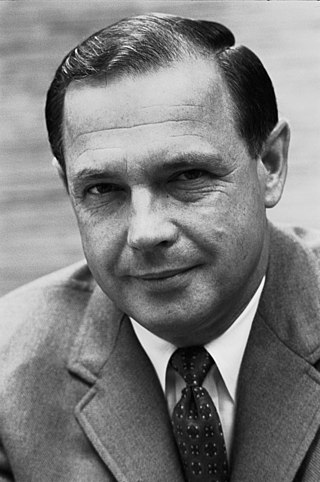
Alexander Porter Butterfield is a retired United States Air Force officer, public official, and businessman. He served as the deputy assistant to President Richard Nixon from 1969 to 1973. He revealed the White House taping system's existence on July 13, 1973, during the Watergate investigation but had no other involvement in the scandal. From 1973 to 1975, he served as administrator of the Federal Aviation Administration.
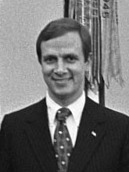
Gordon Creighton Strachan is an American attorney and political staffer who served as an aide to H.R. Haldeman, the chief of staff for President Richard Nixon and a figure in the Watergate scandal.

The Watergate scandal refers to the burglary and illegal wiretapping of the headquarters of the Democratic National Committee, in the Watergate complex by members of President Richard Nixon's re-election campaign, and the subsequent cover-up of the break-in resulting in Nixon's resignation on August 9, 1974, as well as other abuses of power by the Nixon White House that were discovered during the course of the scandal.
Audio recordings of conversations between U.S. President Richard Nixon and Nixon administration officials, Nixon family members, and White House staff surfaced during the Watergate scandal in 1973 and 1974, leading to Nixon's resignation.

Francis Donald Nixon was a younger brother of U.S. President Richard Nixon.
A limited hangout or partial hangout is a tactic used in media relations, perception management, politics, and information management. The tactic originated as a technique in the espionage trade.

William Matthew Byrne Jr. was a United States district judge of the United States District Court for the Central District of California.

Murray M Chotiner was an American political strategist, attorney, government official, and close associate and friend of President Richard Nixon during much of the 37th President's political career. He served as campaign manager for the future president's successful runs for the United States Senate in 1950 and for the vice presidency in 1952, and managed the campaigns of other California Republicans. He was active in each of Nixon's two successful runs for the White House in low-profile positions.
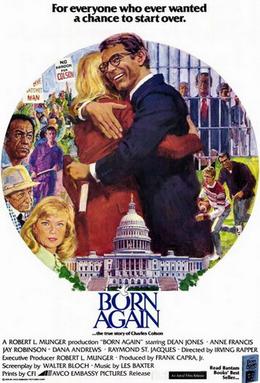
Born Again is a 1978 American biographical drama film directed by Hollywood veteran Irving Rapper depicting the involvement of Charles Colson in the Watergate scandal, his subsequent conversion to Christianity and his prison term. It stars Dean Jones as Colson, Anne Francis as his wife, Dana Andrews as Tom Phillips, Harry Spillman as President Nixon, former Senator Harold Hughes as himself and George Brent in his final film. The film was released by Avco Embassy Pictures.
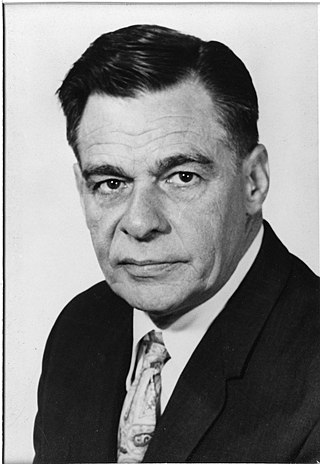
Henry E. Petersen was an attorney and United States federal government official. He served as Assistant U.S. Attorney General during the Richard Nixon and Gerald Ford administrations. He also engaged in ethically questionable communications with Nixon and his staff, providing inside information about the Watergate investigation prior to the appointment of the Special Prosecutor.
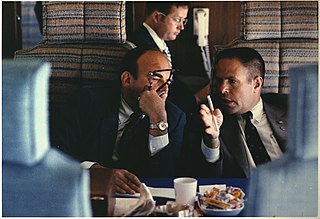
Operation Sandwedge was a proposed clandestine intelligence-gathering operation against the political enemies of U.S. President Richard Nixon's administration. The proposals were put together by Nixon's Chief of Staff H. R. Haldeman, domestic affairs assistant John Ehrlichman and staffer Jack Caulfield in 1971. Caulfield, a former police officer, created a plan to target the Democratic Party and the anti-Vietnam War movement, inspired by what he believed to be the Democratic Party's employment of a private investigation firm.
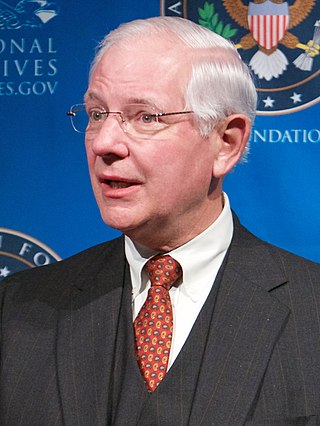
Geoffrey Carroll Shepard is an American lawyer, author and lecturer.
